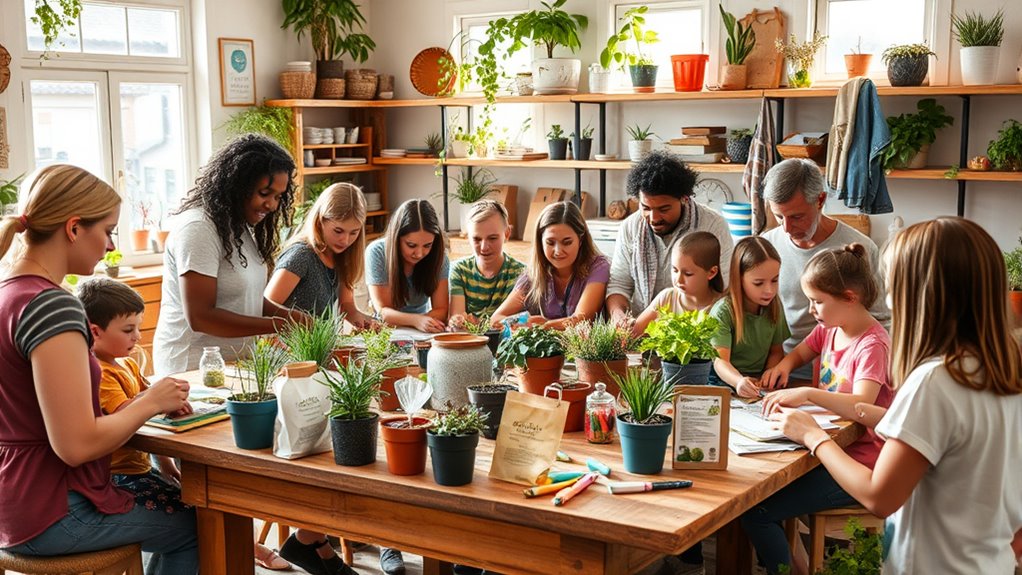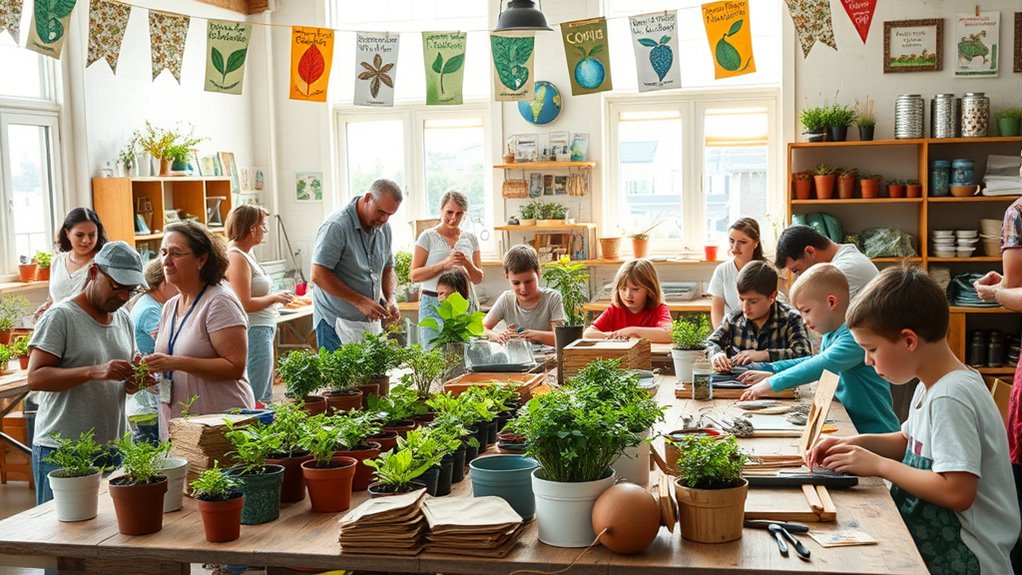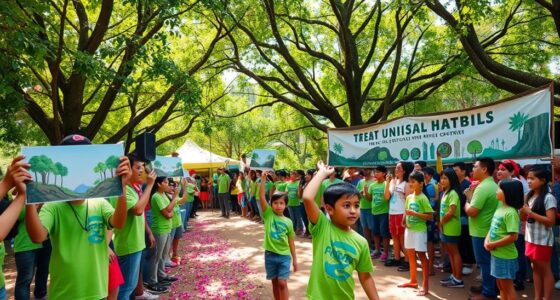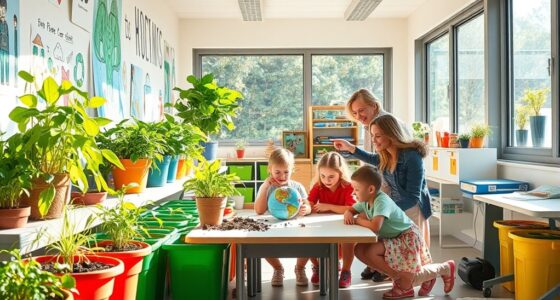Community workshops provide hands-on learning experiences for people of all ages, making sustainability fun and approachable. You can learn practical skills like recycling, composting, and waste reduction while connecting with neighbors. These sessions encourage eco-friendly habits that benefit your environment and community pride. By participating, you help build a more sustainable neighborhood. If you want to discover how these workshops can transform your community, keep exploring for more ideas and tips.
Key Takeaways
- Community workshops promote practical, hands-on learning about recycling, composting, and sustainable practices for all age groups.
- They strengthen neighborhood connections while fostering environmental responsibility and pride through shared activities.
- Participants gain skills in waste sorting, compost bin setup, and eco-friendly routines applicable in daily life.
- Workshops encourage ongoing community engagement, idea exchange, and development of local sustainability initiatives.
- Educational sessions highlight environmental benefits like resource conservation, waste reduction, and reducing landfill emissions.

Have you ever wondered how community workshops can strengthen local connections and foster new skills? These gatherings offer a unique space where neighbors come together to learn, share, and grow. Whether it’s a small neighborhood or a larger town, workshops provide a platform for practical education that benefits everyone. One of the most impactful topics you might encounter is sustainability, especially focusing on recycling methods and composting techniques. When you participate in these sessions, you’re not just learning theoretical concepts—you’re gaining hands-on experience that you can apply immediately in your daily life.
Recycling methods are often at the forefront of community workshops because they address a pressing environmental need. You’ll learn how to sort waste correctly, understand what items are recyclable, and discover local recycling programs. The workshop might include demonstrations on cleaning and preparing recyclables, which helps reduce contamination and ensures that more materials can be effectively reused. By mastering these methods, you reduce waste sent to landfills, conserve natural resources, and contribute to a cleaner environment. Sharing stories and tips with others in the community builds a sense of collective responsibility and pride, strengthening local bonds.
Mastering recycling reduces waste, conserves resources, and fosters community pride through shared responsibility.
Composting techniques are another popular focus, especially as communities seek sustainable ways to handle organic waste. In these workshops, you’ll get hands-on experience creating compost piles or bins, learning the right balance of green and brown materials. The instructor might guide you through the process of turning kitchen scraps and yard waste into nutrient-rich compost that’s perfect for gardens or urban farms. Understanding composting helps you reduce food waste and cut down on methane emissions from organic materials in landfills. Plus, it’s satisfying to see your efforts turn waste into something useful, fostering a sense of accomplishment and environmental stewardship.
Participating in community workshops also means connecting with others who share your interest in sustainability. You can swap ideas, troubleshoot challenges, and discover new ways to incorporate eco-friendly practices into your routine. These events often encourage ongoing involvement, creating networks of people committed to making a difference. The skills you gain aren’t just practical—they also inspire you to take more conscious actions, like advocating for better recycling programs or establishing composting stations in your neighborhood.
Frequently Asked Questions
How Can I Start My Own Community Workshop Program?
To start your own community workshop program, focus on community engagement by identifying local interests and needs. Plan your workshops around topics that resonate with your community, and develop a clear structure for each session. Reach out to local organizations for support, promote your events, and gather feedback to improve. Consistent workshop planning and active engagement will help you build a successful program that benefits everyone involved.
What Funding Options Are Available for Community Sustainability Workshops?
Imagine you’re launching a sustainability workshop and wonder about funding options. You can explore grant opportunities from local governments, environmental organizations, or foundations dedicated to education. Sponsorship options from local businesses willing to support eco-friendly initiatives can also help. For instance, a community project in Portland secured a state grant and sponsorship from a green tech company, enabling free workshops for residents. These avenues can effectively fund your program and boost community engagement.
How Do Workshops Accommodate Different Age Groups and Skill Levels?
You can make workshops inclusive by incorporating age-appropriate activities that engage different groups effectively. Adjust skill level adaptations by offering beginner to advanced options, ensuring everyone feels challenged yet successful. You might group participants by age or skill, or rotate activities to maintain interest. Using versatile materials and clear instructions helps accommodate varying abilities, making the experience enriching for all ages and skill levels.
Are There Online or Virtual Sustainability Workshops Available?
You can find many online resources and virtual platforms offering sustainability workshops. These virtual options make learning accessible from anywhere, allowing you to participate at your convenience. Many organizations host live sessions, webinars, and interactive courses online, making sustainability education flexible for your schedule. Check websites of environmental groups or educational institutions—they often list upcoming virtual workshops designed to teach sustainable practices in engaging ways.
How Do I Measure the Impact of Community Workshops on Sustainability Practices?
You can measure the impact of community workshops on sustainability practices by analyzing participant feedback and behavior change metrics. Start by gathering surveys and testimonials to visualize how ideas translate into action. Track specific behaviors, like waste reduction or energy savings, over time. This approach helps you see if the workshops lead to meaningful change, ensuring your efforts foster lasting sustainability improvements in the community.
Conclusion
By participating in community workshops, you gain practical skills and inspire others to embrace sustainability. These hands-on experiences make eco-friendly living accessible and fun for all ages. Remember, “A journey of a thousand miles begins with a single step.” Every small effort adds up, creating a stronger, greener community. So, get involved today—your actions can spark lasting change and help build a more sustainable future for everyone.









